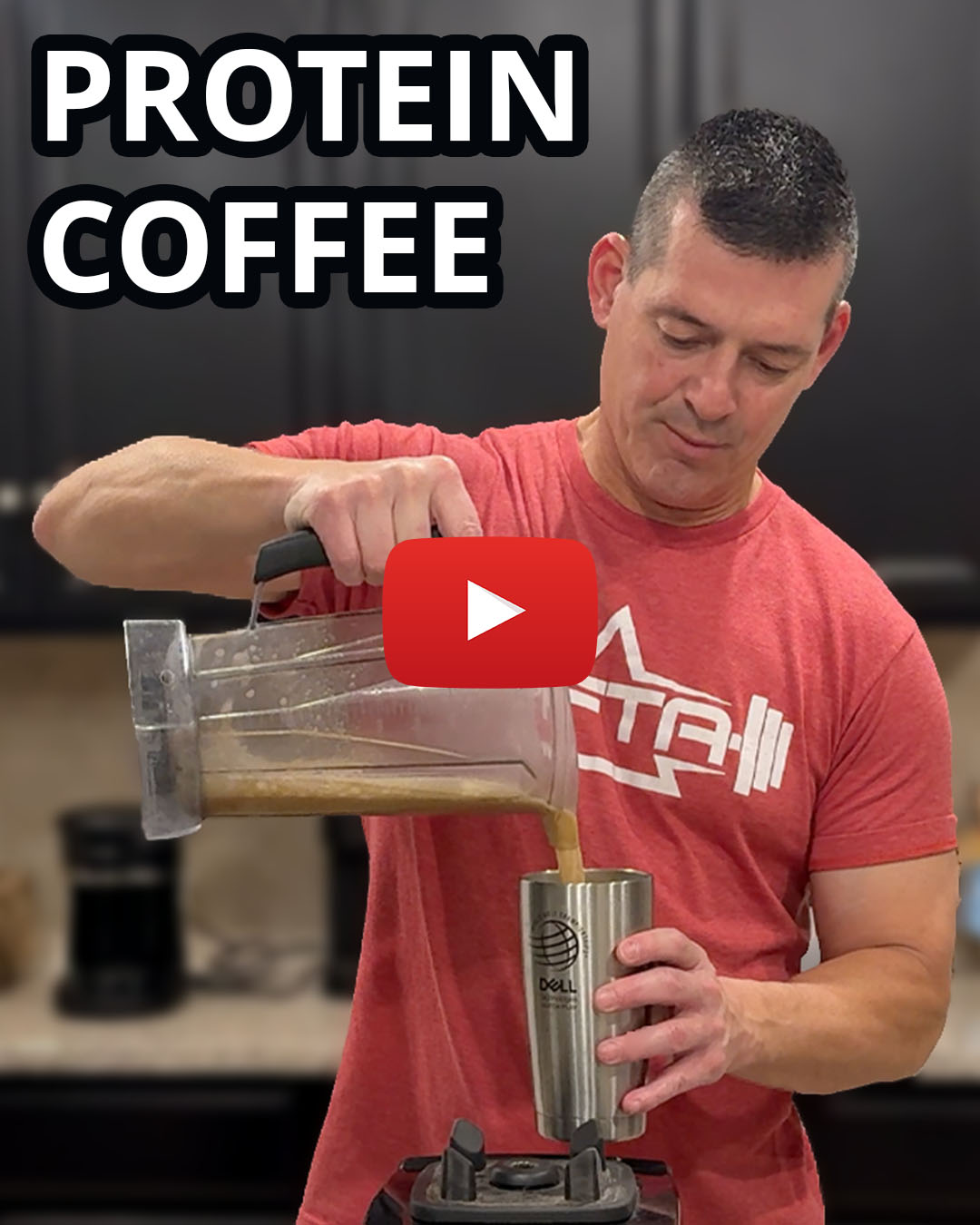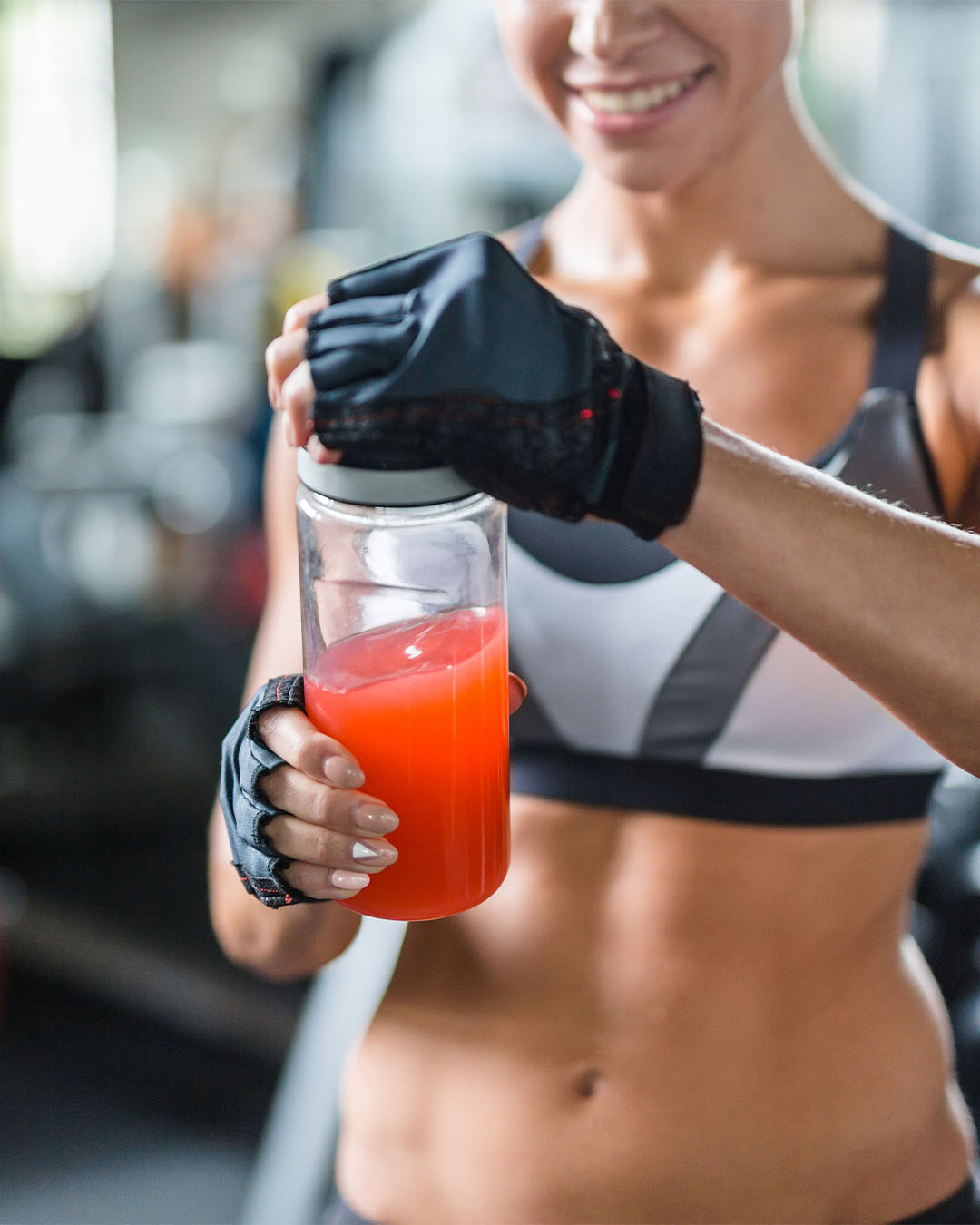Caffeine and Exercise
Do you consume caffeine before exercise? Do you take caffeine for weight loss? In this article, we'll dive into the research to see if caffeine can help you with weight loss, sports performance, and more. Keep reading to learn more about the science of caffeine.
Or, to see how I start every day, click on the image below for my protein coffee recipe.

Weight Loss
There must be something about caffeine and weights loss. After all, caffeine seems to be in all weight loss or fat burning supplements. So does it work? Acheson et al. (1980) was able to show that ingesting caffeine, or coffee, did increase weight loss and burned more fat in some subjects. How does it work? The mechanisms behind caffeine are simple: increased energy, increase caloric expenditure, and suppressed appetite. It does appear that caffeine works for weight loss; but, add exercise and a sound nutrition plan for even better results!
Need help with a diet and/or exercise plan? Click on the image below for more info on personal training.

Fat Burners
Unfortunately, many of the weight loss studies were done with a caffeine/ephedra stack. That stack was very popular back in the day and it worked! Hackman et al. (2006) and Boozer et al. (2002) saw similar results where the treatment group lost more weight and burned more fat than the control group. The mechanisms were the same as previously stated: more energy and more caloric expenditure. But the ephedra stack was also causing some health issues, so in 2004, the FDA banned the sale of ephedra. Today, you can still buy fat burners that give you similar results as the ephedra/caffeine stack. Look at the ingredients, find one you like, and get to working out!
Need more weight loss tips? Click on the image below for our best tips on losing weight!

Resistance Training
There haven’t been many studies on the effects of caffeine on resistance training, but a recent study by Grgic et al. (2017) showed that caffeine may increase muscular strength and muscular power during a workout. The subjects also experienced less pain, which may have contributed to the increased performance. Some lifters even said the caffeine improved focus. In this study, they used caffeine doses of 400 to 600mg. Listen to your body and track your workouts to see what is best for you. If you work out hard, and you need an extra push, caffeine may be exactly what you're looking for.
A better workout with weights also means stronger bones, a faster metabolism, and improved coordination. Don't know where to start? We also recommend starting with our favorite hip extension exercises. Click the image below for more info.

Endurance Training
Although not many studies have been done on weight training, there have been many studies conducted on endurance training. And to be honest, endurance training is where caffeine really shines. Ivy et al. (2009) did a study on cycling performance after drinking Red Bull. The results showed improved performance, but, ironically enough, the athletes didn't feel like they were doing more work. This is great news! Less pain but more gain!
Want to burn more fat and improve your cardiovascular health? One of the best things you can do is high intensity interval training. Click on the image below for more info.

Carbohydrates
Carbs get a bad rap, but if you're active, then carbs can be your friend. There's a reason you see athletes drinking Gatorade during competition. Sugar definitely helps with sports performance and the caffeine/carb stack may be even better! Gant et al. (2010) showed that soccer players improved sprint performance and counter movement jumping after consuming a carbohydrate/caffeine sports drink. Caffeine with carbs can help with your endurance events or long term training sessions.
Our classes cover exercise science and sports nutrition. If you want to learn more about our classes and/or certifications, click on the image below.

Macros
I would be remiss if we talked about carbs and not about your other macros. A good health and fitness plan includes, resistance training, cardiovascular training, and a solid nutrition plan with macros in mind. Macro calculations include fats, protein, and carbs. There are many ways to calculate your macros, but if you want a very simple method, click the image below.

Caffeine After Your Workout?
So caffeine before your workout is beneficial, but, is caffeine after your workout beneficial as well? Taylor (2011) et al. showed that a post-exercise drink that included caffeine, improved exercise intensity the following workout too. This is not to say that caffeine will still be in your system the next day, but caffeine may help with recovery, which will get you ready for the next workout.
That wasn’t the only study which showed positive results. Pedersen (2008) et al. showed a higher muscle glycogen resynthesis rate (66% higher) in carb + caffeine, than carbohydrate alone. There are more things you can do to reduce muscle soreness and speed up recovery. Click on the image below for more info on reducing muscle soreness.

Caffeine and Golf?
Do you play golf? Don't forget your water, caffeine, and snacks. An interesting study showed that caffeine can help your golf game. Stevenson et al. (2009) showed improvements in golf performance after the subjects consumed caffeine. The study was used to determine if the caffeine/carbohydrate mixture could delay any onset of physical and/or mental fatigue. During a simulated round of golf, the subjects were tested on several golf activates. The results showed that even skill movements, like putting, improved with the ingestion of carbohydrates and caffeine throughout the 4-hour period.
It was concluded that the carbohydrate/caffeine mix must improve focus. So next time you play golf, don't forget your water, carbs, and caffeine. Speaking of water, click the image below to read more about drinking water to improve sports performance.

Knowledge is Power
And if you want more tips on exercise and nutrition, add your email below. You'll receive weekly tips directly to your inbox. Plus, you'll also receive the occasional coupon code for our classes.
Summary
Nowadays, you can find caffeine everywhere. It does appear that caffeine can be used to improve performance and to help you with weight loss. It’s also been proven to help resynthesize glycogen for your next workout, if taken shortly after your workout session. The amount of caffeine to improve performance and increase fat burning will vary by individual. Listen to your body. Start with small doses and make notes of your performance and your mood.
Furthermore, if you want more tips on boosting your metabolism, click on the image below. Happy health and happy training!

Written By
R.A. Escobar, PFTA Instructor and Personal Trainer
Sources:
Acheson, K.J., Ph.D., B. Zahorska-Markiewicz, M.D., Ph. Pittet, Ph.D., K. Anantharaman,2 Ph.D., and E. Jequier,M.D. Caffeine and coffee: their influence on metabolic rate and substrate utilization in normal weight and obese individuals. The American Journal of Clinical Nutrition 33: MAY 1980, pp. 989-997.
Boozer, C.N.; Daly, P.A.; Homel, P.; Solomon, J.L.; Blanchard, D.; Nasser, J.A.; Strauss, R.; Meredith, T. Herbal ephedra/caffeine for weight loss : a 6-month randomized safety and efficacy trial. International Journal of Obesity and Related Metabolic Disorders . May2002, Vol. 26 Issue 5, p593. 12p.
Gant , Nicholas; Ali, Ajmol; Foskett, Andrew. The Influence of Caffeine and Carbohydrate Coingestion on Simulated Soccer Performance. International Journal of Sport Nutrition and Exercise Metabolism . Jun2010, Vol. 20 Issue 3, p191-197.
Grgic, Jozo; Mikulic, Pavle. Caffeine ingestion acutely enhances muscular strength and power but not muscular endurance in resistance -trained men. European Journal of Sport Science. Sep2017, Vol. 17 Issue 8, p1029-1036.
Hackman, R. M.; Havel, P. J.; Schwartz, H. J.; Rutledge, J. C.; Watnik, M. R.; Noceti, E. M.; Stohs, S. J. Stern, J. S.; Keen, C. L. International Journal of Obesity . Oct2006, Vol. 30 Issue 10, p1545-1556. 12p.
Ivy , John L.; Kammer, Lynne; Zhenping Ding; Bei Wang; Bernard, Jeffrey R.; Yi-Hung Liao; Jungyun Hwang. Improved Cycling Time-Trial Performance After Ingestion of a Caffeine Energy Drink. International Journal of Sport Nutrition and Exercise Metabolism . Feb2009, Vol. 19 Issue 1, p61-78.k
Pedersen, David J., et al. “High Rates of Muscle Glycogen Resynthesis after Exhaustive Exercise When Carbohydrate Is Coingested with Caffeine.” Journal Of Applied Physiology (Bethesda, Md.: 1985), vol. 105, no. 1, July 2008, pp. 7–13.
Stevenson EJ, Hayes PR, Allison SJ. The effect of a carbohydrate-caffeine sports drink on simulated golf performance. Appl Physiol Nutr Metab. 2009 Aug;34(4):681-8.
Taylor, Conor, et al. “The Effect of Adding Caffeine to Postexercise Carbohydrate Feeding on Subsequent High-Intensity Interval-Running Capacity Compared With Carbohydrate Alone.” International Journal of Sport Nutrition and Exercise Metabolism, vol. 21, no. 5, Oct. 2011, pp. 410–416.